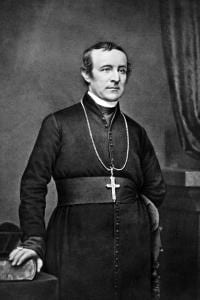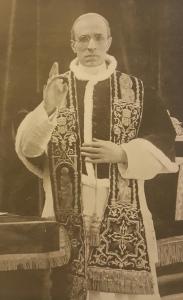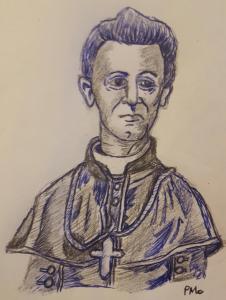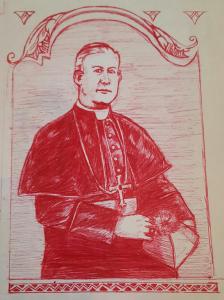![indianandwhite00palliala_0014[1]](https://wp-media.patheos.com/blogs/sites/224/2013/11/indianandwhite00palliala_00141-217x300.jpg)
SIR,— I wish to communicate to you as well as I can the account of an audience received yesterday at 12:30 from His Holiness Pope Leo XIII. When I was ushered into the presence of the Vicar of Christ, a feeling of religious awe took hold of me as I saw, seated on a throne, dressed in a white cassock the successor of St. Peter, whose face struck me by its whiteness, whose eyes were like those of an eagle, and who, though full of animation, told by his white hairs and wrinkled large forehead that 80 years of hard work and 12 years of forced enclosure had left their traces.
Having knelt down and received welcome with a blessing, the Holy Father inquired where my diocese was situated. I answered, in the United States of North America. When was it formed?—On March 7, 1884. Whether it was large?—A little larger than Italy. How many people there were in it?—200,000. How many Catholics?—25,000. How many priests?—28. Whether the people were very intelligent?—I answered: we had a most vigorous, energetic, and wide-awake population; the people, also, as a rule, were moral and law-abiding. How they found a living?—By mining, cattle-raising, and farming. How does religion prosper?—I told the Holy Father that I had brought along some photographs to give him an idea of the institutions our people had erected. The Pope deigned to take the package of photographs in his hands, and, as he looked them over, made his approving comments and appropriate questions. He spoke favorable of the building of the Sisters’ Academy, and asked what Sisters gave education to the girls. As His Holiness did not locate the diocese, I told him that the first missionary was Father Desmet, S.J., who came out in 1840 to bring the faith to the Flathead, Blackfeet, and other Indian tribes in the Rocky Mountains. Leo XIII answered with a smile: “I knew Father Desmet, and saw him when I was a nuncio at Brussels in 1843, 4,5,6.” He was a Belgian, and when the Holy Father heard that I was a native of Belgium, and the city of Bruges, he told me that in 1844 he had assisted there at the procession of the Precious Blood. “Then you were not in the world yet.” “Holy Father,” I replied, “I was born in 1842.” “Oh! Then you were a little baby. I knew Bishop Bousson and his Vicar-General, Mgr. Corselis, a very worthy man, Bishop Malou, and also Bishop Faict.” I replied: “Holy Father, the present Bishop wished me to convey to your Holiness his homage, and to express his sympathy on the occasion of the loss you sustained in the death of your brother the Cardinal.” The Holy Father was much affected by this intelligence, and no doubt souvenirs of the past came came up to his mind, for Bishop Faict, Cardinal Pecci, and Pope Leo were a trio of hard workers at the time of the Vatican Council in 1869-1870.
The Pope asked the particulars of the dislocation of my arm which took place near Bethulia in Galilee on the last day of April, at four p.m., by a fall from my horse, on the way to Nazareth. The Doctor of the English Pilgrimage, Mr. O’Malley, had set it at once. Here in Rome Dr. Cervelli had bandaged it again and all went well, but I could not say Mass, as one arm was tied up. I asked the Holy Father whether during these few days I could celebrate in the American College, assisted by a priest. The privilege was granted with great kindness, and to-day I made use of the Apostolic favour, being assisted by Father Delany, a priest of New York. I asked the Holy Father to bless us, our diocese, its priests, religious and people, and our works. When the Pope, lifting his voice, pronounced a Benediction, saying: “May the blessing of the Almighty God, Father, Son, and Holy Ghost come down upon you, and ever remain.”
“Holy Father,” I said, “we all feel that you are not treated well, and that you suffer from much injustice.” “Yes,” answered Leo XIII, “my condition gets harder all the time, they deprive me more and more of my rights. I am the victim of the revolution. See it is now twelve years that I cannot move outside these walls. I am the only one who has ever suffered so long. But I am submissive to the Providence of God. One thing remains with me: it is the power to speak. That I have used and will use to state the truth and oppose error. Yes I have the power to speak, and I must say, my words are listened to.” As these words were spoken I wished I could have communicated them to the world in all their force, and with the feeling with which they were uttered by the captive of the Vatican.
I showed the Holy Father the photo of the English Pilgrimage made at Jerusalem. His Holiness took a lively interest, inquiring for persons he knew. I told him how successful the Pilgrimage had been, and that the English Pilgrims to the Holy Land, before parting on Mount Carmel, addressed him a joint letter signed by the Bishop of Clifton, the Duke of Norfolk, & c. This letter I presented, and then asked leave to introduce six of the pilgrims who had come to Rome. The petition was granted, and all were received with most paternal kindness. Having received the faculty of giving the Apostolic Blessing to our people on a solemn occasion, I retired thanking God and His Vicar on earth, and treasuring up in my heart all we had seen and heard.
Yours devotedly,
JOHN B. BRONDEL, Bishop of Helena, Montana, U.S.A.
NOTE:
John Baptist Brondel, Montana’s first Catholic Bishop, was born In Belgium on February 23, 1842. After studying at the American College of Louvain, he was ordained in 1864. After serving in Canada, he was named Bishop of Vancouver Island in 1879. He was named Vicar Apostolic of Montana in 1883 and Bishop of Helena the following year. He died on November 3, 1903, in Helena, Montana.
Pope Leo XIII refers here to the uneasy relationship between the Holy See and the Italian government. After the unification of Italy and the end of the Papal States, Pope Pius IX called himself “the prisoner of the Vatican.” Not until the Lateran Treaty of 1929 would diplomatic relations be formalized.
The Tablet, an international Catholic weekly, was founded in London, England, in 1840 and is still in operation.











